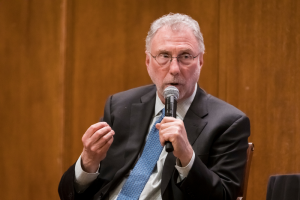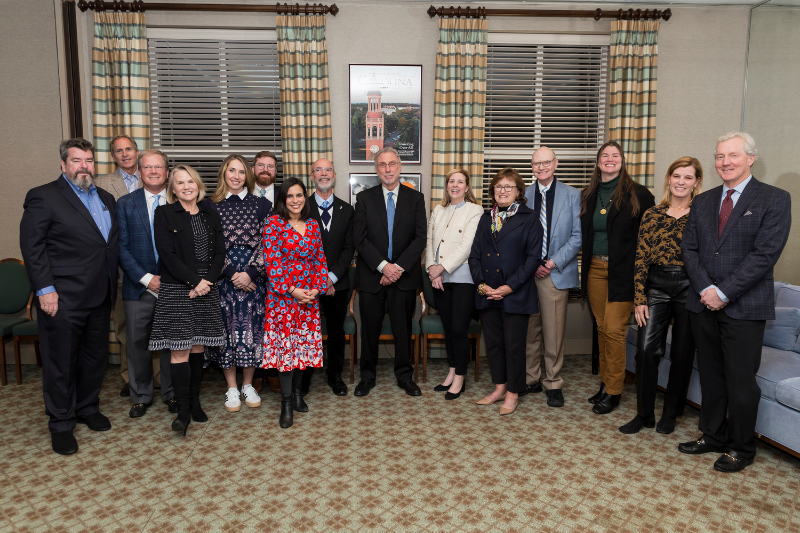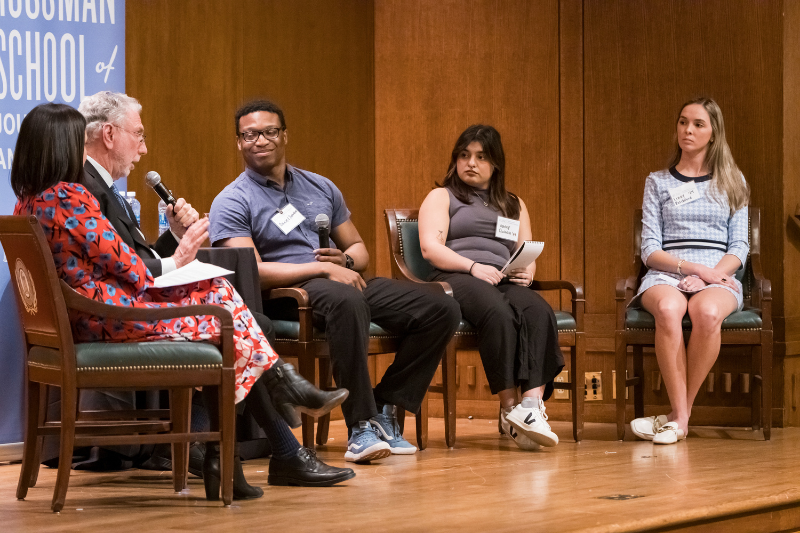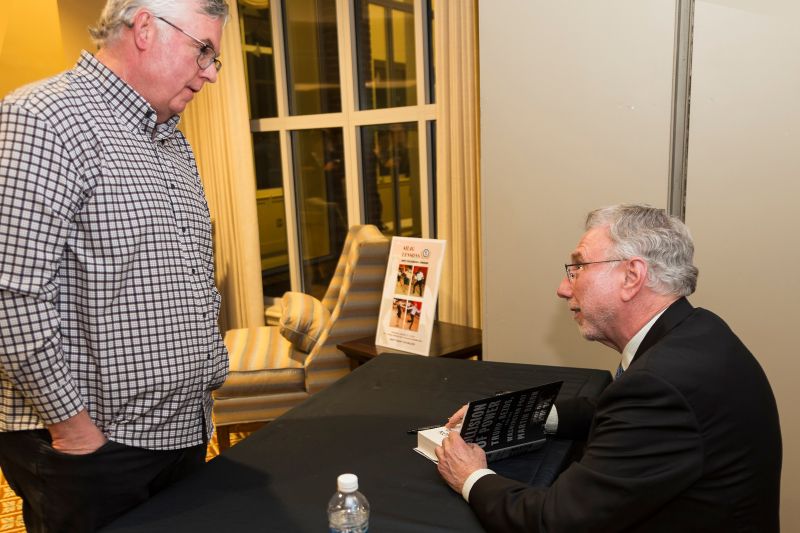Marty Baron’s visit to UNC Hussman shines a spotlight on good journalism

During his three-day visit to UNC Hussman last month, retired journalist Marty Baron spoke to six classes, attended two faculty lunches, had multiple conversations with student journalists and gave the second annual Frank A. Daniels Jr. Lecture.
For a man with a 45-year career in journalism and 18 Pulitzer Prizes, the trip to Chapel Hill was relatively relaxing.
Over his career, Baron served as an editor for multiple renowned publications like The Boston Globe and The Washington Post. He was chosen to give his talk, “At Work, Not at War: Principles for Journalism in Perilous Times,” at the Daniels Lecture, which honors the life and career of Frank A. Daniels Jr., former president and publisher of The News & Observer.
The lecture was held on campus at the George Watts Hill Alumni Center on the evening of January 30, and was attended by nearly 400 students, faculty members and professionals.

Marty Baron, center, with the Daniels family, Leyla Santiago, Dean Raul Reis and the Hussman family.
During his speech, Baron spoke about the fundamental values of journalism, the importance of objectivity in the age of social media and emerging technologies like AI. After his speech, Leyla Santiago, UNC Hussman’s inaugural Daniels Executive-In-Residence, moderated as he answered questions from three UNC Hussman students, covering topics like newsroom unions and advocacy journalism.
Throughout all his conversations, Baron emphasized the importance of repairing trust between publications and the public.
“It's really important that we establish credibility and confidence with the public,” Baron said. “If we expect the public to believe what we report, they have to believe that we went about our work in the most objective and professional way.”
More recently, some media professionals, scholars and educators have taken a more critical view of objectivity, arguing that since it’s questionable if journalists can ever be truly objective, media practitioners should instead focus on being balanced, fair and open to multiple points of view, while being transparent about their own biases.
Baron maintains the importance of objectivity during a time when people’s belief in democracy and trust in news organizations is waning across the nation.
“Journalism plays such an important role in democracy,” Baron said. “Journalism can survive without a democracy, but democracy can't survive without a free and independent press.”
Baron’s lecture was a reminder of the fundamental values that support that role, Santiago said.
“Marty is traditional, capital ‘J’ journalism,” Santiago said. “And I think it's necessary to hear that — if we veer off a little bit — we need to be able to know what the fundamentals and the principles are. And I think he was reminding us of that.”
Santiago, a former international correspondent for CNN with decades of reporting experience, worked with the three UNC Hussman students who joined Baron on stage. The students, chosen to bring a variety of perspectives and experiences to the table, included Daniel Johnson, a graduate student, Ashley Quincin ‘24, an editor for The Daily Tar Heel and Lizzy Rotchford ‘24, a student studying advertising and public relations.

On stage with Leyla Santiago, Daniel Johnson, Ashley Quincin and Lizzy Rotchford.
Quincin was thrilled to have the opportunity to ask Baron questions at the Daniels lecture. She’s always had a love for the 2015 film “Spotlight,” which follows the story of Marty Baron as newly appointed editor of The Boston Globe leading a team of journalists in 2001 investigating the widespread and systemic child sex abuse by numerous Catholic priests in the Boston area.
“It was a surreal experience talking to someone that I had seen portrayed in something I was very passionate about, and then being able to talk to the real person and get their real ideas — it was super interesting, and I was very happy that I was able to do it,” Quincin said.
The three student panelists at the lecture weren’t the only students Baron spoke with during his visit. Within the walls of Carroll Hall and Curtis Media Center, Baron gave guest lectures in classes like “Media Management and Policy,” “Advanced Reporting” and “Writing and Reporting,” Santiago said.
“I wanted to make sure that people had access to him, be it in class, at a faculty lunch or at a student dinner,” Santiago said. “I wanted to be able to have him meet all sorts of students and faculty.”
In one class, UNC Hussman Assistant Professor Erin Siegel McIntyre surprised — and delighted — Baron by pulling up one of his earliest articles from 1976 on the screen behind him. In another, Santiago said Baron happened to be standing in front of the projector at such an angle that the word “journalism” was briefly projected onto his face.
“We kept him busy,” Santiago laughed. “But he was a good sport about it.”
Baron also visited Santiago’s class, “Covering and Engaging Latinx Communities.” A Florida native fluent in Spanish, Baron was editor of The Miami Herald in 2000 during the heated custody battle over a Cuban boy named Elián González who was found stranded in the sea off Florida’s coast. That year, Baron experienced immense backlash from readers who were highly invested in González’s story and what it meant for national pride and the relationship between the two countries.
That was one year before Baron became editor of The Boston Globe and exposed the scandal within the Catholic Archdiocese, which led to the criminal prosecutions of five Roman Catholic priests and encouraged hundreds of victims to come forward. Baron said that the work they did breaking that story was the most gratifying moment of his career.
“[That story] affected the lives of ordinary people, people whose voices hadn’t been heard,” Baron said. “People who were survivors of abuse, who had been trying to get the attention of the press, of law enforcement, of politicians — but didn't get it. And we finally were able to hold the church accountable for the abuses that they had suffered, as well as the cover-up that had taken place over almost half a century.”
From there, Baron continued to lead a thriving career. He spent over a decade at The Boston Globe before becoming executive editor of The Washington Post in 2013, which earned 11 Pulitzer Prizes under his leadership for groundbreaking stories about everything from secret surveillance by the National Security Agency to Russian interference in the 2016 presidential election.
After retiring from The Washington Post in 2021 at the age of 66, Baron is now on a tour for his 2023 book, “Collision of Power: Trump, Bezos, and The Washington Post,” which explores the role of journalism and the nature of power during Trump’s presidency and unceasing attacks on the media.

Baron signed copies of "Collision of Power" after the lecture.
While on his book tour, Baron plans to continue spreading the message about what he thinks the future of journalism should look like.
“I have pretty strong views on how we should carry out our mission and how we can be most effective,” Baron said. “And that's a message that I feel motivated to share with other people with the hope that it’ll have some impact.”
It’s also a message that UNC Hussman was lucky to hear, said Raul Reis, dean of UNC Hussman.
“We are fortunate to have the opportunity to attract industry leaders like Marty Baron to visit our school, meet with our students and faculty and address the University and local communities,” said Reis. “The legacy of Frank Daniels Jr. continues to extend and inspire the important conversations and experiences that prepare the next generation of journalists and communicators for their critical role in our democracy.”
For emerging journalists who have doubts about entering the industry, Baron said that the two qualities that will help them succeed are adaptability and passion.
“If you're passionate about it, you’ll be best at it,” Baron said.